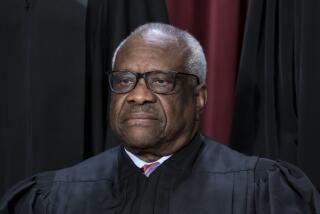Lawmaker’s files sought by grand jury
- Share via
WASHINGTON — A federal grand jury has subpoenaed congressional records from Rep. Curt Weldon (R-Pa.) as part of an escalating Justice Department corruption probe aimed at determining whether Weldon used his influence to win favors for family members, people familiar with the investigation said.
The previously unreported subpoena was issued by a grand jury in Washington before the November election, although it is unclear when Weldon received it.
The 10-term lawmaker was at the time in a tight race to retain his seat representing the Philadelphia suburbs, which he subsequently lost to Democrat Joe Sestak, a retired Navy vice admiral.
Weldon has said public disclosure of the Justice Department investigation, which came three weeks before election day, was politically motivated. He said at the time that he was not aware of any investigation and that he had done nothing wrong.
An attorney for Weldon, William J. Winning, did not return messages Thursday seeking comment.
House rules require members of Congress to promptly report the receipt of subpoenas to the leadership when Congress is in session. Notice of the subpoena is then customarily published in the Congressional Record.
A search of the record Thursday did not turn up evidence that Weldon had disclosed the subpoena.
It is possible that the lawmaker did not receive the subpoena until after Congress adjourned following the election, when different reporting rules would have applied. He still would have been required to notify the leadership, but in that case the subpoena would not become public in the Congressional Record until Congress reconvenes in January.
Weldon formerly held the powerful vice chairmanship of the House Armed Services Committee and was a leading voice in Washington on the affairs of former Eastern bloc nations. The FBI is investigating whether he traded his influence to get lobbying business for his daughter Karen and others.
Karen Weldon and Charles Sexton, a close friend and political advisor to the lawmaker, operated Solutions North America. Investigators are examining about $1 million in contracts from foreign clients that Weldon may have helped steer to the firm.
The corruption probe became known on Oct. 16, when the FBI searched six sites in Philadelphia and Jacksonville, Fla. They included the lobbying firm run by Weldon’s daughter and one of its clients, a Russian company, Itera International Energy Corp.
The Times reported in 2004 that Solutions North America won contracts from companies or individuals that Weldon tried to help. The beneficiaries included two struggling Russian firms and a Serbian family linked to accused war criminal Slobodan Milosevic.
The Times reported that Itera was paying Solutions $500,000 a year for public relations help around the same time that Weldon was extolling the energy company and helping round up 30 congressional colleagues for a dinner honoring the firm’s chairman.
Weldon said at the time of the October searches that he had “no communication or contact with anyone, nobody from the Justice Department” about an investigation and had not been told that he was a target of any probe.
Another lawyer for Weldon, William B. Canfield, said at the time that the House Ethics Committee had reviewed the matter and that it had been resolved, although the report has never been made public.
Canfield could not be reached Thursday.
The FBI subsequently opened an investigation into whether law enforcement officials illegally leaked information about the Weldon probe to the press. It is illegal for government officials to reveal grand jury material publicly.
Legal experts said the fact that Weldon lost his seat did not relieve him of the obligation to report the subpoena.
“If they were served with a subpoena before the House adjourned, then they were supposed to give notice immediately,” said Charles Tiefer, a University of Baltimore law professor and a former counsel to the House.
“For a member not reelected, the rules are no different,” Tiefer said. But he observed that the House has virtually no power to sanction former members for violations of its rules.
More to Read
Get the L.A. Times Politics newsletter
Deeply reported insights into legislation, politics and policy from Sacramento, Washington and beyond. In your inbox twice per week.
You may occasionally receive promotional content from the Los Angeles Times.










